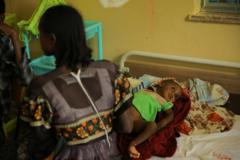The ongoing UN climate summit in Azerbaijan faces a deadlock as key nations, including the Vatican, resist incorporating women's rights into climate change action plans due to fears of LGBTQ+ inclusivity.
**Vatican's Opposition Hinders Women's Rights Progress at COP29**

**Vatican's Opposition Hinders Women's Rights Progress at COP29**
The Vatican's stance against gender-inclusive language in climate discussions has raised concerns regarding women's rights amid COP29 negotiations.
The Vatican has emerged as a key player in blocking discussions centered around women’s rights at the UN COP29 climate conference in Azerbaijan, sparking significant controversy. The Pope's representative, Secretary of State Pietro Parolin, allied with nations like Saudi Arabia, Russia, Iran, and Egypt, has stalled negotiations intended to enhance support for women experiencing the brunt of climate change challenges.
According to Colombia’s environment minister, Susana Muhamad, these nations object to the reference of "gender" in the proposed agreement, concerned it may encompass transgender individuals and lead to the inclusion of rights related to sexual orientation. As a consequence, the negotiations aimed at strengthening women’s access to resources in the context of climate change have come to a standstill, prompting alarm from various charities observing the conference.
ActionAid and other non-profit organizations have emphasized the necessity of reaching an agreement; the UN reports that women and girls represent approximately 80% of those displaced due to climate-related events. For over a decade, global acknowledgment of the disproportionate impact of climate change on women has been underscored, especially considering their roles as primary caregivers and the subsequent barriers they face during climate disasters.
The Lima Work Programme on Gender had sought a revision to integrate distinct women’s experiences shaped by factors such as age, race, and socio-economic status. However, the Vatican and its allies reject the proposal, invigorating concerns from advocates like Mwanahamisi Singano of the Women's Environment and Development Organization about the implications of excluding discussions concerning the rights of marginalized groups.
In an increasingly concerning backdrop, reports indicate that the Vatican's position reflects a disturbing global trend against both women’s and LGBTQ+ rights. While Pope Francis has made strides in LGBTQ+ inclusion within the Church context, the Vatican maintains traditional views on marriage and related issues, outlining clear opposition to gender identity changes as articulated in the document "Dignitas Infinita."
With just days remaining at COP29 and the potential expiration of the UN gender action program looming, there is growing anxiety amongst supporters of women's rights regarding the trajectory of these talks. The absence of adequate female representation—only 36% of negotiators were women in the prior year’s conference—compounds the challenges in adequately reflecting the needs of those most affected by climate change.
As the summit continues, a coalition of 17 countries, including the EU, advocates that the empowerment of women and girls, in all their diversity, is essential for effectively addressing the ongoing climate crisis.
According to Colombia’s environment minister, Susana Muhamad, these nations object to the reference of "gender" in the proposed agreement, concerned it may encompass transgender individuals and lead to the inclusion of rights related to sexual orientation. As a consequence, the negotiations aimed at strengthening women’s access to resources in the context of climate change have come to a standstill, prompting alarm from various charities observing the conference.
ActionAid and other non-profit organizations have emphasized the necessity of reaching an agreement; the UN reports that women and girls represent approximately 80% of those displaced due to climate-related events. For over a decade, global acknowledgment of the disproportionate impact of climate change on women has been underscored, especially considering their roles as primary caregivers and the subsequent barriers they face during climate disasters.
The Lima Work Programme on Gender had sought a revision to integrate distinct women’s experiences shaped by factors such as age, race, and socio-economic status. However, the Vatican and its allies reject the proposal, invigorating concerns from advocates like Mwanahamisi Singano of the Women's Environment and Development Organization about the implications of excluding discussions concerning the rights of marginalized groups.
In an increasingly concerning backdrop, reports indicate that the Vatican's position reflects a disturbing global trend against both women’s and LGBTQ+ rights. While Pope Francis has made strides in LGBTQ+ inclusion within the Church context, the Vatican maintains traditional views on marriage and related issues, outlining clear opposition to gender identity changes as articulated in the document "Dignitas Infinita."
With just days remaining at COP29 and the potential expiration of the UN gender action program looming, there is growing anxiety amongst supporters of women's rights regarding the trajectory of these talks. The absence of adequate female representation—only 36% of negotiators were women in the prior year’s conference—compounds the challenges in adequately reflecting the needs of those most affected by climate change.
As the summit continues, a coalition of 17 countries, including the EU, advocates that the empowerment of women and girls, in all their diversity, is essential for effectively addressing the ongoing climate crisis.





















